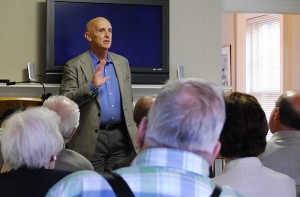Shasha Seminar 2018: Suicide and Resilience: Finding the Words


This year’s Shasha Seminar for Human Concerns, “Suicide and Resilience: Finding the Words,” will be held Sept. 14–15. It will begin with opening remarks by Leslie Shasha ’82, PhD, in Memorial Chapel at 4 p.m., followed by the keynote address by author and suicide loss survivor Eric Marcus on “Resilience in the Aftermath of Suicide.”
The Shasha Seminar, an annual educational forum for Wesleyan alumni, parents, and friends, explores issues of global concern in a small seminar environment. Endowed by James Shasha ’50, P’82, the Shasha Seminar for Human Concerns supports lifelong learning and encourages participants to expand their knowledge and perspectives on significant issues. Last year’s seminar for example focused on Guns in American Society.

This year’s codirector, Professor Emeritus of Psychology Karl Scheibe, spoke with the Connection about the preparation, the program, and his hopes for what this might bring to the campus.
Q: How did you come to be codirector of the Shasha Seminar this year?
A: It came to me as an invitation. It’s like a lot of things; it grows out of your history. Having been at Wesleyan a long time, I taught a lot of students, and many of them have gone on in psychology. Occasionally, one of those former students will have an assignment for me that, as a teacher, makes sense. Leslie Shasha ’82 is a psychologist, and she wanted to have a Shasha program focus on suicide: suicide awareness, suicide prevention, treatment for people who are suffering from loss, and a whole host of related problems.
She suggested to the Office of Academic Affairs that they get in touch with me to help put together the program. They had the foresight to give me a partner, Jennifer D’Andrea PhD, the director of Counseling and Psychological Services, a clinical psychologist.
I accepted with great pleasure because I admire and like Leslie, and I think the topic is a terrific one. I remember suicides that have occurred on campus over my decades here. They are difficult to deal with when they occur.
Q: How have you dealt with this topic in your own academic work?
A: The whole question of suicide is one that I have thought of for quite a while because of my concern with the problems of human identity. For a while, the theoretical meanderings that I’ve allowed myself around problems of self and identity have produced some formulations about why people would think to kill themselves.
One of the classical paradoxes in psychology and social science derives from Emile Durkheim and his classical work on suicide, where it becomes clear that suicide is not simply a result of a difficulty in one’s life. That is to say, you find certain paradoxical things, like the more successful nations and groups of people tended to be more suicide-prone rather than less. It’s a problem that resists any simple explanation.
The paradoxes around suicide struck me as a challenging issue to address in designing a program that will be of genuine interest to, and perhaps even of benefit to, the Wesleyan community.
Q: Do you expect that many of those who attend will have been affected by suicide?
A: Yes. The sense I have is that people don’t voluntarily want to talk about suicide. That is to say: certainly when one occurs, you have to talk about it. In the meantime, it’s a suppressed conversation. Because of my engagement in this program, I have taken the occasion to ask friends, acquaintances, family members, and others, “Tell me about your experiences with suicide in your life. Have you had any association?” Surprisingly, just about everybody has.
Q: Please tell us about the phrase in the title: “Finding the Words.”
A: I’ve been privy to some of the sufferings that come in this community, and after a suicide, people often feel bewildered and at a loss for fruitful ways to deal with or react to what is obviously an extraordinarily shocking event. That led me to this phrase that is used now in the title of the program: “Suicide and Resilience—Finding the Words.” It seems to me that, for a community, the real challenge is to find words that can be articulated as a way of reacting in a humane and compassionate way to this kind of difficulty when it happens, and not to back away from the challenge of finding the words. I think of it as a poetic challenge, not a scientific one.
Q: And what is your hope for this program?
A: What Jennifer D’Andrea does is to try not just to treat individuals on this campus who have psychological difficulties, but also to help create a set of conditions on-campus that will make living here better, more satisfactory, and somehow more authentic.
The hope is that this seminar might be preventative. People worry about doing a program on suicide awareness because there’s apprehension about triggering. I think, “Okay, be apprehensive if you want to, but I believe that the guiding motivations here are compassionate.”
Our hope is that this increased awareness will be productive of a greater understanding and a more generally compassionate attitude to people who may be on the fringes of some kind of suicidal event. Our hope is that an enlightened understanding will be preventative.
To see the scheduled program and to register click here.

